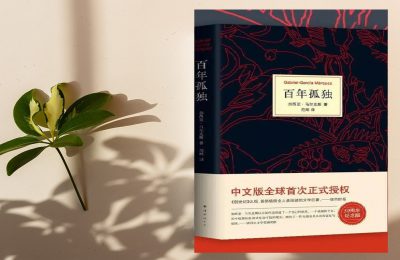《百年孤独》,是哥伦比亚作家加西亚·马尔克斯创作的长篇小说,是其代表作,也是拉丁美洲魔幻现实主义文学的代表作,被誉为“再现拉丁美洲历史社会图景的鸿篇巨著”。故事讲述马孔多小镇和布恩地亚家族的兴衰变化与传奇故事,记录了家族命运与百年历史,是重复地叙述相同而荒唐的命运,是拉美国家几百年命运的缩影,独具意味地隐喻着人类“文明”史的建立、发展与终结,在荒凉失落与荒唐可笑中诠释宿命式的轮回。家族中人物名字是相同或相近的,预示着他们拥有殊途同归的孤独命运。《百年孤独》以布恩地亚被捆在树上为开端,以他被蚂蚁吃掉为结束,通过细腻丰富的笔触、大胆自由的想象、魔幻的叙事艺术,讲述布恩地亚家族命运与历史,刻画人物孤独的灵魂与自我救赎,进而体现出个人、家族及全人类的悲悯与孤独情怀,让人们重新思考时代发展与人性变化。《百年孤独》被世界文坛誉为魔幻现实主义文学的主峰,已被翻译成30多种文字出版,销量逾1000万册。
Chapter 10
YEARS LATER on his deathbed Aureliano Segundo would remember the rainy afternoon in June when he went into the bedroom to meet his first son. Even though the child was languid and weepy, with no mark of a Buendía, he did not have to think twice about naming him.
“We’ll call him Jos?Arcadio,?he said.
Fernanda del Carpio, the beautiful woman he had married the year before, agreed. ?rsula, on the other hand, could not conceal a vague feeling of doubt. Throughout the long history of the family the insistent repetition of names had made her draw some conclusions that seemed to be certain. While the Aurelianos were withdrawn, but with lucid minds, the Jos?Arcadios were impulsive and enterprising, but they were marked with a tragic sign. The only cases that were impossible to classify were those of Jos?Arcadio Segundo and Aureliano Segundo. They were so much alike and so mischievous during childhood that not even Santa Sofía de la Piedad could tell them apart. On the day of their christening Amaranta put bracelets on them with their respective names and dressed them in different colored clothing marked with each one’s initials, but when they began to go to school they decided to exchange clothing and bracelets and call each other by opposite names. The teacher, Melchor Escalona, used to knowing Jos?Arcadio Segundo by his green shirt, went out of his mind when he discovered that the latter was wearing Aureliano Segundo’s bracelet and that the other one said, nevertheless, that his name was Aureliano Segundo in spite of the fact that he was wearing the white shirt and the bracelet with Jos?Arcadio Segundo’s name. From then on he was never sure who was who. Even when they grew up and life made them different. ?rsula still wondered if they themselves might not have made a mistake in some moment of their intricate game of confusion and had become changed forever. Until the beginning of adolescence they were two synchronized machines. They would wake up at the same time, have the urge to go to the bathroom at the same time, suffer the same upsets in health, and they even dreamed about the same things. In the house, where it was thought that they coordinated their actions with a simple desire to confuse, no one realized what really was happening until one day when Santa Sofía de la Piedad gave one of them a glass of lemonade and as soon as he tasted it the other one said that it needed sugar. Santa Sofía de la Piedad, who had indeed forgotten to put sugar in the lemonade, told ?rsula about it. “That’s what they’re all like,?she said without surprise. “crazy from birth.?In time things became less disordered. The one who came out of the game of confusion with the name of Aureliano Segundo grew to monumental size like his grandfathers, and the one who kept the name of Jos?Arcadio Segundo grew to be bony like the colonel, and the only thing they had in common was the family’s solitary air. Perhaps it was that crossing of stature, names, and character that made ?rsula suspect that they had been shuffled like a deck of cards since childhood.
